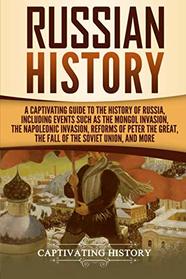Russian history is not my strong suit so I wanted to learn more about this country's politics and traditions. I really liked the fact that the author divided Russian history (from the beginning of the Viking Prince Rurik in 862 CE until the collapse of the Soviet Union in 1991) into three major sections. This really helped to clarify eras and leaders.
Here are some things I was surprised to learn about Russia. Because of so much migration, the DNA of Russians shows them to be mainly Slavic, with Finnish, Scandinavian, Turkic, and Baltic influences. I was also surprised to learn that Russians wanted a leader so badly that they entreated other leaders to come and rule their country. The history begins with a Viking taking rule over Russian lands. Another surprise was learning that a tribe of Turkic Khazars in Russia had converted to Judaism back in the 800s CE.
Another interesting fact was that when the Ottoman Empire emerged, it turned Constantinople into its capital and thus Moscow became the most important center for Orthodox Christianity (instead of Constantinople). Vasily III (1505-33 CE) was the first Russian ruler to adopt the Byzantine state emblem of the two-headed eagle, to represent imperial dominion over east and west. It remains as the state emblem of the Russian Federation.
We know him as 'Ivan the Terrible' but this book makes a point of saying something different. Ivan was Grand Prince of Moscow from 1533 to 1547 and the first Tsar of Russia from 1547 to 1584. However, a closer translation (to his name) would be Ivan the Fearsome or Ivan the Formidable.
I liked that the Russians sometimes exercised a more compassionate solution for getting rid of unwanted rulers (instead of murdering them). They sent them to monasteries for the rest of their lives (possibly to repent for their sins at their leisure). Of course, this was all ancient history, before they figured out how effective sending someone to Siberia could be. The section about Russia's problems with Napoleon was really interesting; I want to read something more about this timeframe.
It was shocking to learn that 27 million Russians died in World War II. This was also the first I'd learned about the background of Mikhail Gorbachev. No wonder he was such a change from the old-line Soviets. Be sure to read his story; his family really suffered from the old-style Soviet politics and he was ready to make significant changes.
The conclusion of this book is a very well-worded summary of the history of the Russian nation.
Here are some things I was surprised to learn about Russia. Because of so much migration, the DNA of Russians shows them to be mainly Slavic, with Finnish, Scandinavian, Turkic, and Baltic influences. I was also surprised to learn that Russians wanted a leader so badly that they entreated other leaders to come and rule their country. The history begins with a Viking taking rule over Russian lands. Another surprise was learning that a tribe of Turkic Khazars in Russia had converted to Judaism back in the 800s CE.
Another interesting fact was that when the Ottoman Empire emerged, it turned Constantinople into its capital and thus Moscow became the most important center for Orthodox Christianity (instead of Constantinople). Vasily III (1505-33 CE) was the first Russian ruler to adopt the Byzantine state emblem of the two-headed eagle, to represent imperial dominion over east and west. It remains as the state emblem of the Russian Federation.
We know him as 'Ivan the Terrible' but this book makes a point of saying something different. Ivan was Grand Prince of Moscow from 1533 to 1547 and the first Tsar of Russia from 1547 to 1584. However, a closer translation (to his name) would be Ivan the Fearsome or Ivan the Formidable.
I liked that the Russians sometimes exercised a more compassionate solution for getting rid of unwanted rulers (instead of murdering them). They sent them to monasteries for the rest of their lives (possibly to repent for their sins at their leisure). Of course, this was all ancient history, before they figured out how effective sending someone to Siberia could be. The section about Russia's problems with Napoleon was really interesting; I want to read something more about this timeframe.
It was shocking to learn that 27 million Russians died in World War II. This was also the first I'd learned about the background of Mikhail Gorbachev. No wonder he was such a change from the old-line Soviets. Be sure to read his story; his family really suffered from the old-style Soviet politics and he was ready to make significant changes.
The conclusion of this book is a very well-worded summary of the history of the Russian nation.




